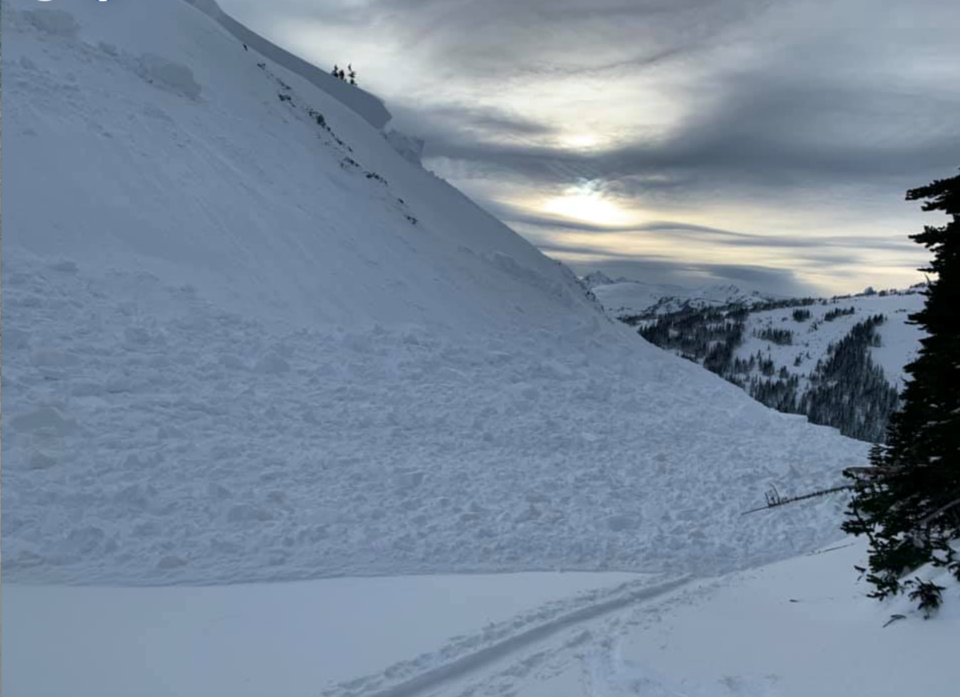On March 8, 2022, my son, Zachary, and I left for a two-day backcountry trip to Cowboy Ridge, a popular touring destination located just east of Whistler. The risk profile for the trip was low, with good weather and moderate avalanche warnings.
We set out from the base of Flute, and after about four hours of touring, we came to the northernmost base of Cowboy Ridge. As we slogged up towards the ridge, I decided to take a lower angle to ease my pain while Zach continued up a steeper section. At this point we were in “climbing mode,” meaning our bindings and boots were not locked to our skis. In this mode, one’s ability to manoeuvre is severely limited, especially on a steep slope with a heavy load.
As we climbed, I paused to watch Zach summit the ridge and inch out of sight. Glancing at the slope above, I noted a slight convex. I also noted the sun had been warming the snow for most of the day, making the snowpack less stable. These two conditions are a textbook case for high-avalanche probability. Through a veil of exhaustion, I knew I needed to move. Then, suddenly, I heard the tell-tale WHOOMPF! The mountain moved first.
I could see the ridge coming down towards me. My first thought was, “No f$%&ing way is this happening!” I was in disbelief. The snow beneath me liquified, sending me head-first down the slope. I summersaulted in what I can only describe as a washing-machine rotation. I swam, desperate to stay afloat. Snow forced its way into my mouth, interrupting my breathing. My thoughts went to survival and death.
I had absolutely no control over my body or environment. Life flashed before me. How was I going to die? Head trauma, suffocation, or compression? I thought of being buried. I was in full panic. Then, abruptly, I stopped. My head and upper body were on top of the snow, and I lay head down on the slope looking up towards the ridge. I was alive.
Then I saw it. A wave of snow building and coming towards me. “How interesting,” I thought. “It looks like a wave in the ocean.” Then BOOM! Back into the machine I went, swimming for my life. I’m gone, I thought. After a short, awful eternity I stopped. I was above the snow. I lay breathing heavily, blinking at the blue sky. I checked myself. Are my limbs intact? Is there any pain? Nothing. I unbuckled my pack and stood up. I was in one piece. My jacket and pants were full of snow and a portion of one ski binding remained locked to my right boot. The rest of my ski gear had been torn away and swallowed by the mountain. It was a miracle.
Above me was a wide swath of avalanche debris. A Class 2-3 avalanche carried me about 200 metres down the mountain. I was thankful and lucky to be alive, but I was very angry with myself and commenced a loud diatribe of profanity. The Whiskey Jacks twittered their disapproval, but otherwise there was total silence and the serene beauty of the setting remained unchanged. It was a simple yet exquisite moment and a stark reminder that nature does not care if I live or die.
Zach, in the meantime, had no idea what had transpired. Minutes later, he appeared at the top of the ridge looking for me and saw what had happened. He skied down in shock and disbelief. I immediately went into rescue mode and called 911. The importance of an active cellphone signal cannot be underestimated. Our situation could have been much worse, as exiting the area without skis would be extremely difficult. Within 30 minutes, a Whistler Search and Rescue helicopter was on the ground retrieving us. The search-and- rescue professionals were all business, and offered no pretense of sympathy or encouragement. They’d seen this play before.
They told us in no uncertain terms to get our asses into the chopper. En route back to Whistler they asked for a debrief on what had occurred. Despite their extensive experience, I could see their disbelief.
“Normally we’d be picking up a body,” said the pilot.
An hour later, we were back in Whistler looking for a beer—from near death to a bar stool. There’s a profound metaphor in there somewhere. Both Zach and I learned many lessons from this encounter. Personally, I am still processing it all. I’m left with a residual PTSD, which occasionally reminds me that any notion of control is a façade. Nature takes what nature wants.






